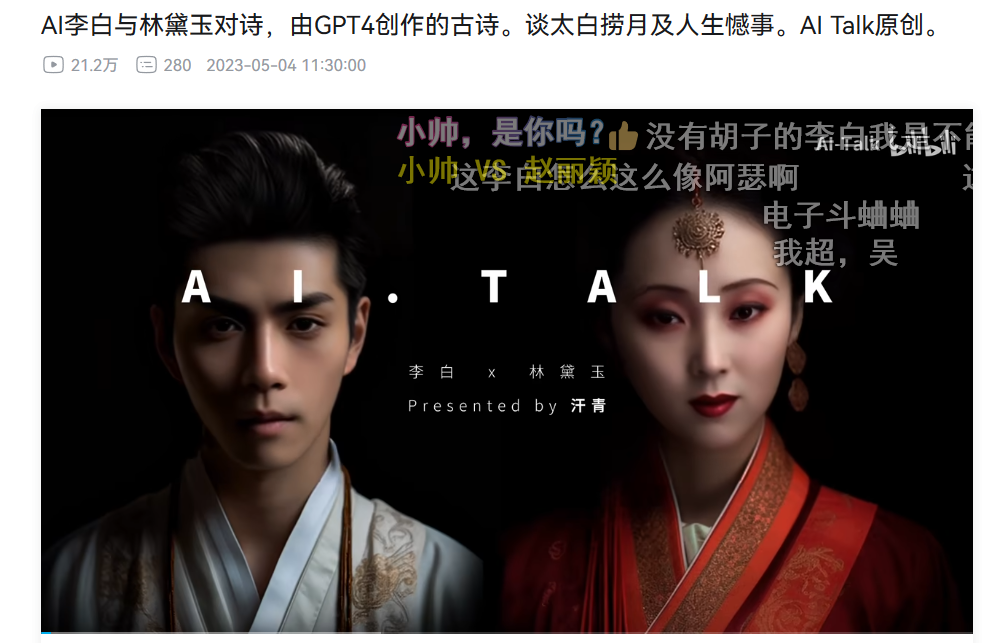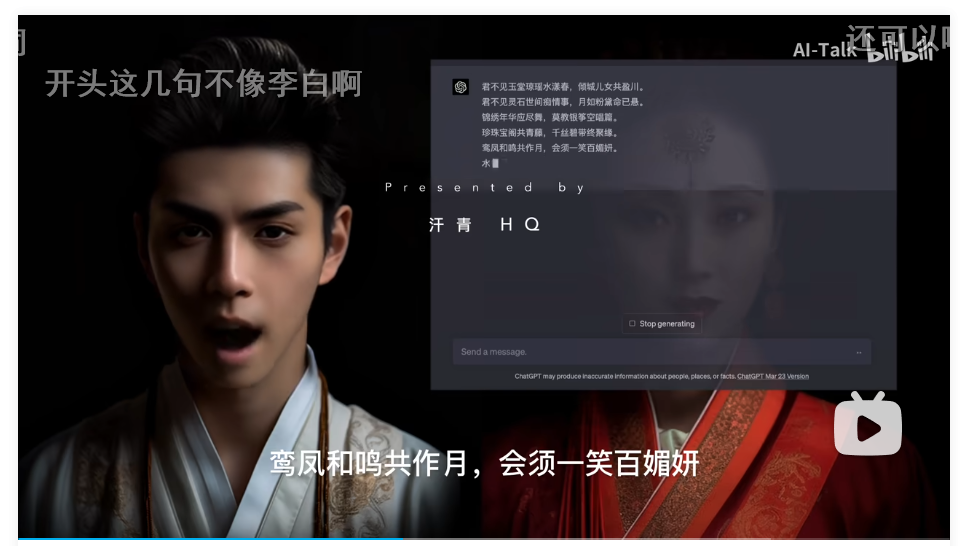Author丨Chen Siqi
Editor丨Sun Chaoyi
Source: 21 Finance
"I heard that you once tried to befriend the moon, thinking that you couldn't bear to see the moon alone in the sky. However, since ancient times, the bright moon has always been accompanied by the gentle breeze every night, and it may not be possible to befriend it. If I were the young master, I would know that everything has its fate and cannot be forced. Trying to befriend the moon would be in vain."
If it weren't heard with one's own ears, no one would expect these words to come from the mouth of "Sister Lin". And the one she was "conversing" with was the "Poet Immortal" Li Bai from four dynasties ago.
In early May, Bilibili up host "AI-Talk" released the work "AI Li Bai and Lin Daiyu's Poetry Exchange". The 3.5-minute video, every word and sentence was generated by GPT-4. Similar "mash-up" videos include "AI Nietzsche converses with AI Joker" and "Tom Cruise talks with Kant", among others.

Bilibili Screenshot
"The content is harmonious, the language is exquisite, and the logic is also good. It can be seen that the level of AI's text creation has reached a medium to high level, scoring 80 or above," commented Jin Yuanpu, director of the Cultural and Creative Industries Research Institute of Renmin University of China and professor of the School of Literature.
Recently, Jin Yuanpu gave a lecture titled "The New Situation of the Development of Large AI Models and the Hundred-Model Battle" at the Shenzhen Citizens' Cultural Lecture Hall. The fact that a literature professor who traditionally talks about poetry and literature is now talking about AI reflects the extent to which large models have "gone beyond" various industries.
In an interview with a reporter from the Southern Finance and Economics All-Media, Jin Yuanpu said that one cannot simply understand AI language models like ChatGPT from a technical perspective. Because large models can integrate all the texts, cultures, and thoughts left by past eras, they actually concern the boundaries of human wisdom that can be reached. The exploration of large models should focus on the long term.
In the medium to short term, as long as enough material is "fed" to the large model, it can generate content of sufficient quality, making it a double-edged sword—empowering creators, but also replacing or partially replacing them.
In the fields of literature, journalism, foreign languages, and fine arts, the use of AI is particularly common. Eye-catching news headlines such as "Generate a picture in 30 seconds, with a cost as low as 2 cents" and "AI machine translation reduces costs to 1%" have aroused anxiety among many "workers" about being replaced in their professions.
Transmitted to the younger generation, as the national college entrance examination scores are released one after another, many traditional humanities majors such as journalism, Chinese language, and minority languages are "cooling down" to varying degrees.
"The belief that professions such as literature, journalism, and minority languages will soon be replaced by AI is actually an exaggeration of AI's impact," Jin Yuanpu believes. Based on a large amount of publicly available materials, AI can help complete repetitive and consuming practical work, and its works often surpass those of industry practitioners at the middle and lower levels. However, once it delves into completely independent literary creation, including the expression of vivid and delicate human emotions and the exploration of deep philosophical issues, AI is unable to compete.

(Jin Yuanpu. Provided by the interviewee)
AI with "medium to high" performance
In February of this year, Jim Mullen, CEO of Reach, the publisher of the British newspapers Daily Mirror and Daily Express, publicly stated that they would explore the use of ChatGPT to assist journalists in writing short reports on local weather and traffic. At the same time, there were rumors that a certain financial media in China issued a notice to all editorial departments about the use of ChatGPT.
Gradually, the use of ChatGPT in news creation is no longer a novelty. Strategies for media practitioners have begun to appear on the internet, including how to quickly generate headlines, how to write TV or radio promotional scripts, and how to quickly generate tweets, LinkedIn posts, and other social media posts based on already published news content.
"The quality of AI-generated content depends on how well the large model has been fed in advance. In some relatively simple fields, if the large model has already integrated a relatively comprehensive background material, it can instantly complete a report of good quality, at least at a medium to high level, greatly enhancing the productivity of the news industry," Jin Yuanpu said.
The same applies to the field of literature. Recently, China Literature Group released the first large model in the domestic online literature industry, "Yuewen Miao Bi", which is said to understand content (stories, characters, worldviews), understand creation (understand the creative techniques of online literature), and understand the "online literature memes" formed in the interaction between writers and readers.
According to statistics from the Literature Research Institute of the Chinese Academy of Social Sciences, the market size of China's online literature in 2022 was 38.93 billion yuan, an 8.8% year-on-year increase, and the number of online literature writers has accumulated to over 22.78 million.
Faced with such a huge market, Jin Yuanpu believes that if writers can effectively leverage large models, human-machine collaboration will elevate the writing level from "medium to high" to "excellent", while significantly reducing time and labor costs.
However, AI is also a "double-edged sword", bringing joy to human labor liberation on one hand, and causing anxiety similar to the "Lee Sedol's defeat to AlphaGo" on the other: Will AI "defeat" humans comprehensively?
In March, the famous American linguist and philosopher Chomsky responded, "The human brain is an extremely efficient and even elegant system, requiring only a small amount of information to operate; it seeks not to infer brute correlations between data points, but to create explanations."
In the comments section of the video "AI Li Bai and Lin Daiyu's Poetry Exchange", many netizens also found the pain points of AI creation: "It has rhyme but lacks coherence, it has words but lacks emotion."

Bilibili Screenshot
What are the differences between AI and professional writers? Jin Yuanpu told the reporter that an author once conducted an experiment: asking ChatGPT to write a piece titled "Father's Back" imitating Zhu Ziqing's "The Back".
Although there were no errors in the wording, ChatGPT's work was difficult to resonate with readers: "In my memory, although my father was not good with words, his back showed his sense of responsibility and commitment as a man… He was the backbone of the family, the most important role model and supporter in my life."
"Prose values unique ideas and sincere expression, but ChatGPT has always been talking about grand principles. It seems that when ChatGPT collected data, it absorbed a lot of 'chicken soup', forming a rigid and hollow expression template, making it difficult to feel the warmth within," Jin Yuanpu said.
In this sense, Jin Yuanpu believes that we should not take a pessimistic view of the infiltration of AI into fields such as news, literature, and art. The "feelings" of ChatGPT are actually the induction and integration of existing materials, while literary creation emphasizes uniqueness and innovation.
How humans and machines coexist
Even though humans have their emotional perception that cannot be replaced by ChatGPT, the panic that humanities majors and jobs will be replaced by artificial intelligence is still rampant in public opinion, and it has even affected the enrollment situation of traditional humanities majors such as journalism, Chinese language, and minority languages at certain domestic universities this year.
In the face of this "double-edged sword" of AI, how can humans and machines explore a mutually beneficial balance?
Jin Yuanpu believes that the "uselessness of humanities" is an exaggeration of the influence of AI and underestimates the subjective initiative of humans. However, in the era of technology, the training mode for "humanities students" does need to be optimized and adjusted, focusing on improving their cross-disciplinary composite capabilities.
"Humanities talents should have at least three compound abilities. First, they should have been influenced by literature and art, which are the breeding ground for creative inspiration; second, they should have a certain level of technical knowledge to improve the quality and efficiency of learning with the latest technological achievements; and third, they should have a certain level of financial and accounting knowledge and the ability to manage and operate," Jin Yuanpu explained.
Under the pressure of AI, humans continue to improve themselves, and AI has never stopped iterating and upgrading.
Currently, AI large models have developed two paths: general large models and industry-specific large models. The former is equivalent to receiving "general education", with strong generalization and multi-scenario task processing capabilities, such as ChatGPT and Huawei's PanGu large model; the latter is equivalent to receiving "professional education", using industry knowledge to fine-tune large models to meet the needs of specific industries such as finance, literature, and media, such as BloombergGPT and FinBERT in the financial field, and Yuewen Miao Bi in the online literature field.
Although the landing scenarios are becoming more diverse and the applications are becoming more common, AI at the current stage still experiences "mental confusion", with cases of artificial "intelligence" turning into "idiocy" occurring from time to time.
Jin Yuanpu believes that large models concern the boundaries of human wisdom, can absorb all existing knowledge, and integrate all the texts, cultures, and thoughts left by past eras. Therefore, the exploration of large models should focus on the long term, support more large models in various industries, promote competition and selection between general large models and industry-specific large models, and explore the legal and ethical dilemmas brought about by large models in applications, such as intellectual property and social division of labor.
In the process of active deployment by enterprises in various fields, Jin Yuanpu mentioned that policy guidance and support are indispensable, which is also why he chose to talk about AI in Shenzhen this time.
At the end of May, Shenzhen issued the "Action Plan for Accelerating the High-Quality Development and High-Level Application of Artificial Intelligence in Shenzhen (2023-2024)". It mentioned promoting "thousands of industries + AI" and encouraging enterprises in industries such as finance, commerce, industry, and transportation to upgrade their existing production, service, and management methods based on artificial intelligence technology.
Synchronized with the document is the first batch of "City + AI" application scenario list in Shenzhen, covering 26 scenarios such as ports, scenic spots, and food safety supervision.
Jin Yuanpu told the reporter that Shenzhen's development strategy of "thousands of industries + AI" and the goal of building a "global artificial intelligence pioneer city" are forward-looking. Although there are not many large model products developed by Shenzhen enterprises among those released domestically, relying on the city's technological innovation foundation and increasingly perfect policy and regulatory system, Shenzhen's subsequent performance is worth looking forward to in the wave of the AI era.
免责声明:本文章仅代表作者个人观点,不代表本平台的立场和观点。本文章仅供信息分享,不构成对任何人的任何投资建议。用户与作者之间的任何争议,与本平台无关。如网页中刊载的文章或图片涉及侵权,请提供相关的权利证明和身份证明发送邮件到support@aicoin.com,本平台相关工作人员将会进行核查。




